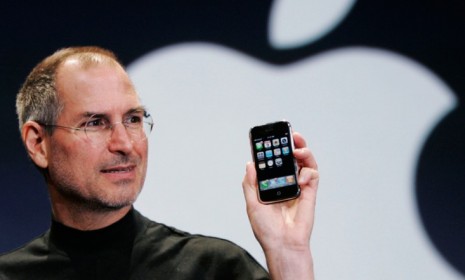Why Steve Jobs was like Ronald Reagan — and 3 other famous leaders
A year after his death, the late Apple boss is remembered in rarefied company

A free daily email with the biggest news stories of the day – and the best features from TheWeek.com
You are now subscribed
Your newsletter sign-up was successful
Steve Jobs, the visionary Apple co-founder who brought personal computers, mp3 players, smartphones, and tablets to the masses, died a year ago today, following a long battle with pancreatic cancer. (Apple is honoring Jobs with a moving memorial video on its homepage.) Equal parts innovator and authoritarian, Jobs had a fierce, unwavering style of leadership and a brilliant imagination that left a seismic imprint well beyond the tech industry, turning a start-up founded in Steve Wozniak's garage into what is now the world's most valuable company. How is Jobs' legacy resonating, now, 365 days after his passing? Here, four great men Jobs is being compared to:
1. Steve Jobs was like Henry Ford
Just like the automotive innovator, Jobs was "one of those rarefied individuals who had not only a vision" but also the "will and force of personality to execute it through America's greatest cultural triumph: The public corporation," says Mat Honan at Wired. Jobs didn't just disrupt industries; "he fundamentally traumatized them," from computing, to movies, to music, and especially telecommunications. "Even if you find him morally repugnant or prefer his competitors' products, you would have to be a fool to argue against his influence and stature."
The Week
Escape your echo chamber. Get the facts behind the news, plus analysis from multiple perspectives.

Sign up for The Week's Free Newsletters
From our morning news briefing to a weekly Good News Newsletter, get the best of The Week delivered directly to your inbox.
From our morning news briefing to a weekly Good News Newsletter, get the best of The Week delivered directly to your inbox.
2. Steve Jobs was like Thomas Edison
When Jobs died, the world "rushed to eulogize him in glowing terms," says Brandon Griggs at CNN. "Genius. Visionary. A modern-day Thomas Edison." And when Jobs is remembered decades from now, it'll be as the man who invented the iPhone and iPad, "not as the executive who was sometimes a tyrant." Truthfully speaking, "does anybody really care whether Alexander Graham Bell was cranky?" Of course not.
3. Steve Jobs was like Ronald Reagan
Jobs' legacy has taken on a "mythical role for people who write about Apple that's very similar to the way conservative pundits invoke the late President Ronald Reagan," says Rebecca Greenfield at The Atlantic Wire — as a "mythical do-no-wrong hero." Apple's recent flub with Maps caused pundits to falsely lament that such a mishap would've never happened on Jobs' watch, much the same way some pundits say Reagan would have never embraced the Tea Party or dissed the 47 percent.
A free daily email with the biggest news stories of the day – and the best features from TheWeek.com
4. Steve Jobs was like Walt Disney
Disney was "the closest thing corporate America had to a Steve Jobs-like figure before Steve Jobs came along," says Harry McCracken at TIME. Like Jobs, the Mickey Mouse creator had the foresight to leave a "deeply competent team" in his stead, and the studio continues to release movies very much like the ones it had been making when Disney passed away in 1966. In Apple's case, that team includes the best of the best: CEO Tim Cook, "design god" Jonathan Ive, and marketing honcho Phil Schiller. All of them "understand how to make great products."
-
 The ‘ravenous’ demand for Cornish minerals
The ‘ravenous’ demand for Cornish mineralsUnder the Radar Growing need for critical minerals to power tech has intensified ‘appetite’ for lithium, which could be a ‘huge boon’ for local economy
-
 Why are election experts taking Trump’s midterm threats seriously?
Why are election experts taking Trump’s midterm threats seriously?IN THE SPOTLIGHT As the president muses about polling place deployments and a centralized electoral system aimed at one-party control, lawmakers are taking this administration at its word
-
 ‘Restaurateurs have become millionaires’
‘Restaurateurs have become millionaires’Instant Opinion Opinion, comment and editorials of the day